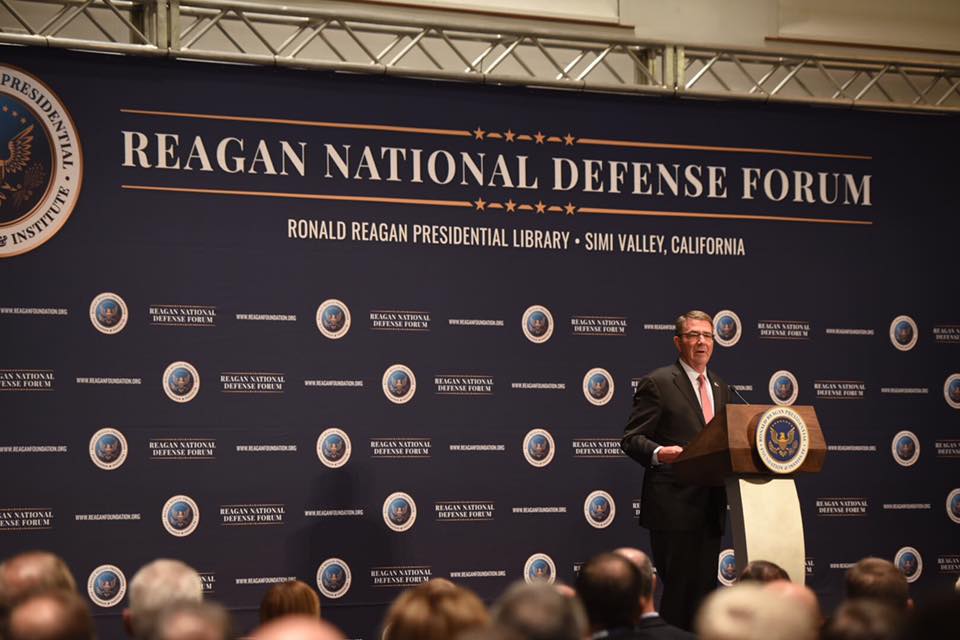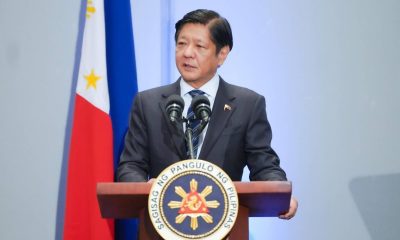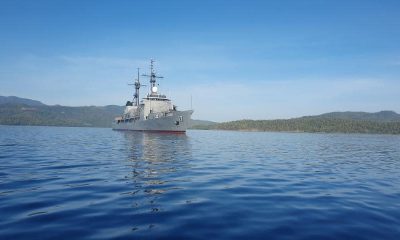News
Mattis slams China on South China Sea island weaponization

China’s placement of weapons systems on manmade islands in the South China Sea is designed to intimidate and coerce others in the region, Defence Secretary Jim Mattis said Saturday. (Photo: U.S. Secretary of Defense/Facebook)
SINGAPORE — China’s placement of weapons systems on manmade islands in the South China Sea is designed to intimidate and coerce others in the region, Defence Secretary Jim Mattis said Saturday, laying out a sharp criticism of Beijing at an international security forum and threatening larger consequences if militarization continues.
He warned that America’s recent move to disinvite China from a multinational naval exercise this summer was an “initial response” to the militarization of the islands. It was, he said, a “relatively small consequence, I believe there are much larger consequences in the future.”
China relying on muscle to use weapons to pursue goals not favoured by international tribunals “is not a way to make long-term collaboration the rule of the road in a region that’s important to China’s future,” Mattis said, when asked to elaborate more on the consequences. “There are consequences that will continue to come home to roost, so to speak, with China, if they don’t find a way to work more collaboratively with all of the nations who have interests.”
The U.S., he said, remains committed to ensuring free and open transit in the region. And he said he doesn’t believe that China’s actions will pay off. Militarizing the islands, Mattis said, will not enhance China’s standing in the world.
“Despite China’s claims to the contrary, the placement of these weapons systems is tied directly to military use for the purposes of intimidation and coercion,” Mattis said, referring to the recent deployment of anti-ship missiles, surface-to-air missiles, electronic jammers and other equipment on the Spratly Islands, and the landing of bomber aircraft at Woody Island.
Mattis also struck at one of the key, longstanding disputes between the U.S. and China, telling the conference that America will continue to provide defence equipment and services to Taiwan and oppose any effort to alter the status quo. China claims the self-governing island as its own territory to be brought under its control by force if necessary.
But in a quick pivot, he said the U.S. welcomes co-operation with China “wherever possible,” and announced that he has accepted Beijing’s invitation to visit there soon. It remains to be seen if that invitation will stand after this conference.
Mattis’ comments triggered an equally pointed reaction from a Chinese official at the meeting.
Senior Col. Zhao Xiaozhuo said a U.S. move a couple years ago to send two warships into China’s “territorial waters” was a violation of law, and an “obvious provocation to China’s national security and territorial integrity.”
Mattis responded that the question reflected a fundamental disconnect with the way international tribunals have spoken on the matter.
“We do not see it as a militarization by going through what has traditionally been an international water space,” said Mattis of the U.S. ship movements through the South China Sea. “What we see it as, is a reaffirmation of the rules-based order.”
As expected, the Pentagon chief gave only a brief mention of the ongoing negotiations for an historic summit later this month between President Donald Trump and North Korean leader Kim Jong Un. Trump announced Friday that the nuclear-weapons summit he had cancelled with North Korea’s Kim Jong Un is back on. The summit is expected to be here in Singapore.
Mattis said the Pentagon will “hold the line” and support the diplomatic effort to secure the “complete, verifiable, and irreversible denuclearization of the Korean Peninsula.”
The Pentagon leader’s comments at the annual Shangri-La Dialogue came in the wake of a tumultuous few weeks between the U.S. and China.
Last week the U.S. withdrew an invitation for Beijing to participate the exercise known as Rim of the Pacific. China had participated in the exercise known as Rim of the Pacific in 2014 and 2016.
The Pentagon said the decision to disinvite the Chinese Navy was triggered by what it called strong evidence that China has deployed weapons systems on the islands, and called on China to remove them. China says it is within its rights to build up defences on islands in the South China Sea that it believes are its sovereign territory.
China’s activities, Mattis said in his speech Saturday, stand “in stark contrast to the openness of what our strategy promotes; It calls into question China’s broader goals.”
House Armed Services Committee Chairman Mac Thornberry, R-Texas, who was attending the conference, said China is alienating other nations and nations must band together and say the actions are unacceptable.
The U.S. response to China’s weaponization of the islands continued on Sunday, as two U.S. warships sailed close to the Paracel Islands, which lie north of the Spratlys. It was the latest freedom of navigation operation designed to challenge Beijing’s claims. China protested the manoeuvr.
In recent years, the U.S. had sought to stabilize military relations with China, but the militarization of the islands has been a persistent point of conflict. Many nations fear that Beijing will use the construction on the islands to extend its military reach and potentially try to restrict navigation in the South China Sea.
China’s delegation at the conference is being led by Lt. Gen. He Lei, vice-president of the People’s Liberation Army’s Academy of Military Science. China has not sent high-level officials to the three-day meeting, in an apparent attempt to deflect attention from its campaign to expand its sovereignty across virtually the entire South China Sea.
Mattis made clear that the U.S. does not expect nations to choose between the U.S. and China, adding that Beijing should have a voice in shaping the region, while allies have a voice in shaping China’s role.
The U.S., he said, “will continue to pursue a constructive, results-oriented relationship with China, co-operation when possible, and competing vigorously where we must.”























